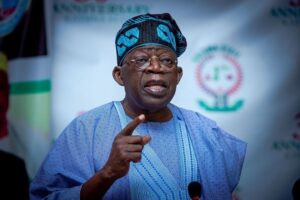In a negative assessment of President Bola Tinubu’s governance, Phrank Shaibu, the Special Assistant on Public Communication to former Vice President Atiku Abubakar, has drawn a striking comparison between Tinubu’s once-prominent political emblem, the broken shackle, and the swastika, which historically shifted from a sign of good fortune to one of tyranny.
In his article titled “De-cap-stated!”, Shaibu illustrates how the swastika, originally a symbol of nationalism and prosperity across various cultures, became synonymous with the oppressive regime of Adolf Hitler and the Nazi party.
In a similar vein, Shaibu contends that the broken shackle, once a beacon of emancipation and human rights, has now transmuted into a representation of oppression under Tinubu’s rule.
“During a campaign rally in Ogun State, President Tinubu’s infamous Emilokan declaration—an egotistical assertion of his claim to power—has transformed the broken shackle into a mark of tyranny and political misconduct,” Shaibu expressed.
The Emilokan phrase, meaning “it is my turn” in Yoruba, was initially a source of pride for Tinubu’s followers, prominently featured on caps that bore the broken shackle symbol, known as Emilokan caps.
Initially, these caps embodied Tinubu’s promises to uphold human rights, enhance the economy, and replicate the successes of Lagos throughout Nigeria. His backers had faith in his democratic principles and envisioned a prosperous future for the nation. However, as Shaibu points out, the reality has diverged sharply from these hopeful expectations.
“Now, everyone recognizes that Emilokan is not about collective prosperity; it’s about a ravenous seizure of state resources for personal gain,” Shaibu remarked.
He further accused Tinubu of accumulating personal wealth at the expense of Lagosians, challenging the prevailing narrative that Tinubu’s administration was the catalyst for Lagos’ economic success.
“Tinubu didn’t develop Lagos; he enriched himself through the labour of Lagosians,” he asserted.
The disillusionment surrounding the Emilokan symbol has reached such an extent that the caps, once in high demand, are now left to collect dust.
“The vendors who once eagerly showcased the Emilokan caps at busy intersections now feel burdened by their unsold inventory,” Shaibu noted.
What was once a coveted item has turned into a source of embarrassment for many of Tinubu’s supporters, symbolizing unfulfilled promises and a political climate leaning toward authoritarianism.
In his critique, Shaibu also juxtaposed Tinubu with the revered Chief Obafemi Awolowo, a legendary figure in Nigerian politics recognized for his progressive vision.

Initially, Tinubu’s followers compared him to Awolowo, expecting him to emulate the esteemed leader’s legacy by creating a prosperous and inclusive administration. However, Shaibu dismisses this analogy as a significant “political impersonation fraud.”
“People now understand that Tinubu is not Awolowo,” Shaibu insisted, arguing that the perception of Tinubu as a progressive leader has disintegrated in light of his government’s actions, which appear more self-serving than beneficial to the public.
The disappointment with Tinubu’s presidency transcends the political realm, as Shaibu points out that the Emilokan caps, which once held significant political weight, have become a source of shame for many Nigerians. Just as the swastika was outlawed following Nazi Germany’s defeat, he believes the Emilokan caps are now relics of “political deceit and disillusionment.”
For Shaibu, the evolution of the Emilokan symbol encapsulates Tinubu’s broader failure to fulfil his commitments. What was once a sign of hope, liberation, and prosperity has transformed into a stark reminder of unfulfilled potential and deepening discontent.
Shaibu’s emphasis was finally that the political reality of Tinubu’s presidency had fallen drastically short of the aspirations ignited during his campaign.
As Nigeria navigates the unfolding consequences of Tinubu’s administration, the fate of the Emilokan symbol poignantly underscores the current political landscape.




